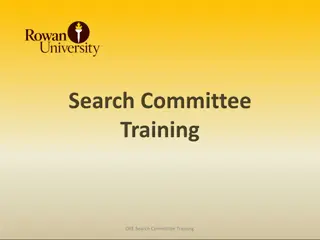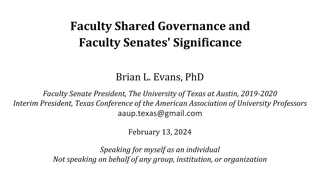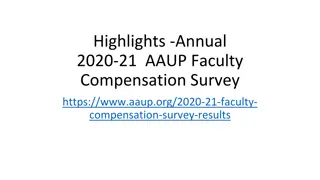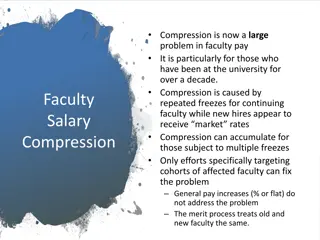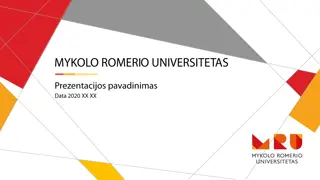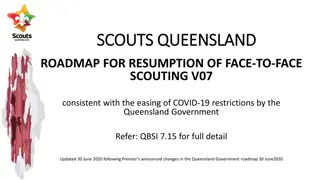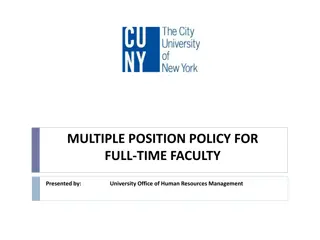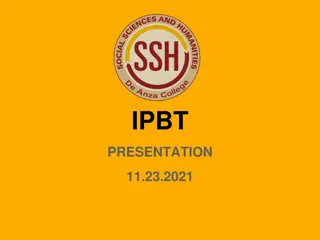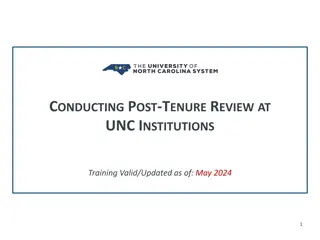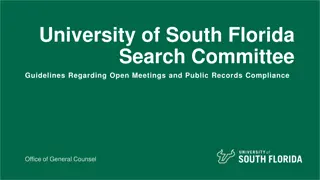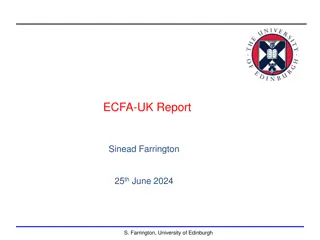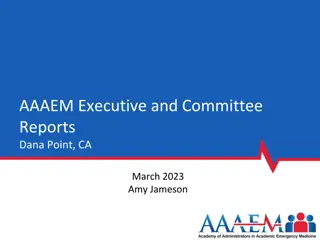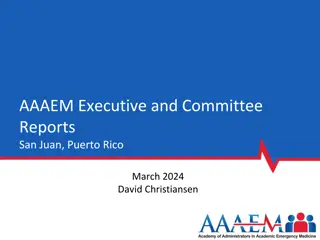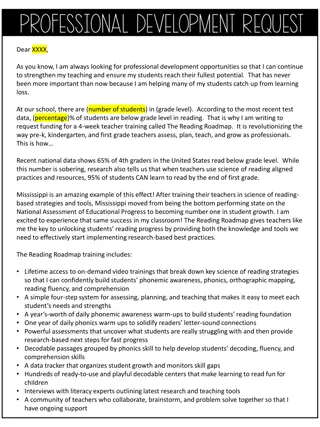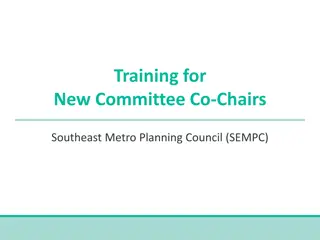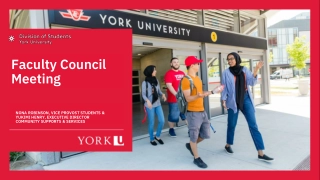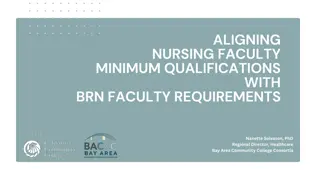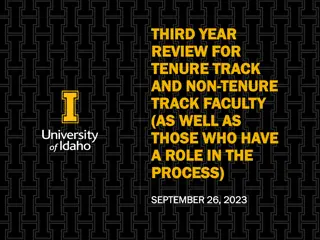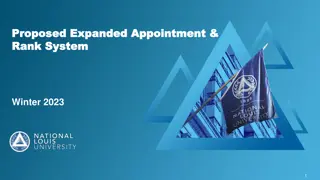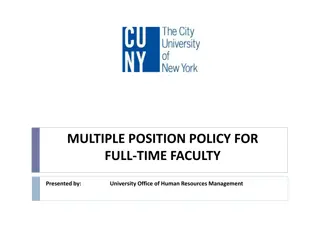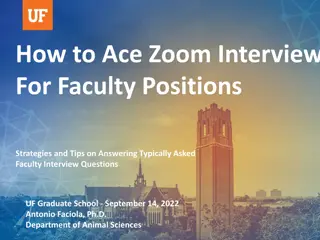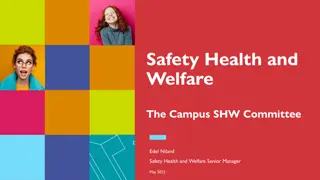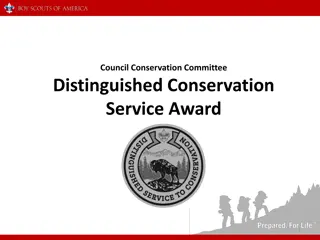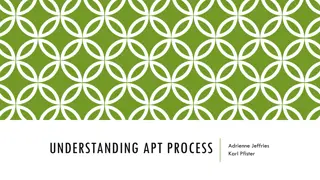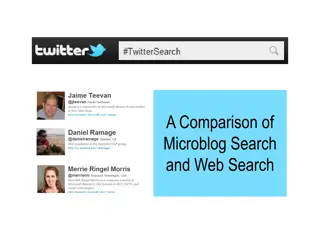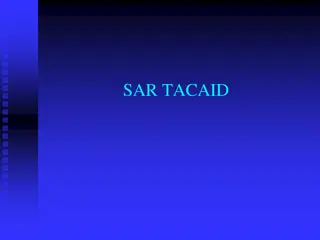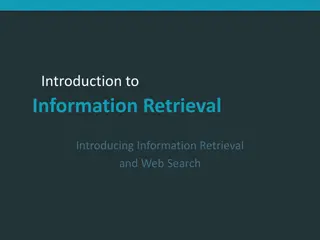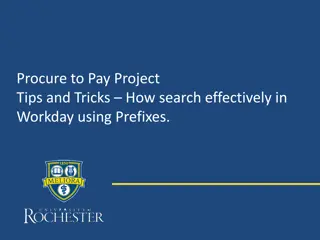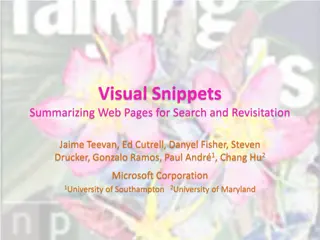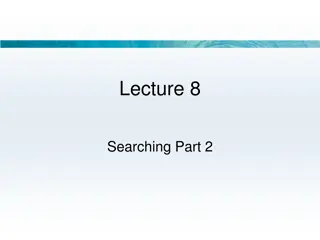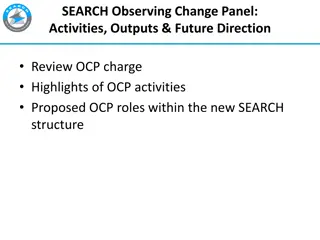RBHS Faculty Search Committee Training Roadmap
This training roadmap covers the essential elements of forming and conducting a successful search committee for RBHS faculty recruitment. It includes information on roles and responsibilities, recruitment processes, biases, and resources to facilitate a fair and inclusive selection process.
Download Presentation

Please find below an Image/Link to download the presentation.
The content on the website is provided AS IS for your information and personal use only. It may not be sold, licensed, or shared on other websites without obtaining consent from the author. Download presentation by click this link. If you encounter any issues during the download, it is possible that the publisher has removed the file from their server.
E N D
Presentation Transcript
RBHS Faculty Search Committee Training
Roadmap Introduction/Engagement Activity Search Committee Charge General Expectations Policies and Procedures Advertising and Recruitment Review of Applications Interviews and Campus Visits Presenting the Finalists Conscious and Unconscious Bias Resources 2
Introduction Search committees: Play an important role in recruiting and shaping RBHS faculty Have the ability to make substantive changes at RBHS and the University by helping to recruit faculty that represent our high standards of excellence and our inclusive culture Contribute to and enhance the image of RBHS and the University 3
Introductions and Engagement Activity Introduce yourself Name, Rank/Title, School/Department What are the elements of a good search? What are the biggest challenges to recruiting the best candidates? 4
Search Committee Charge Search Details Position(s) to be filled rank(s)/title(s) Scope of the search internal, local, national or international Deadlines Discuss any unique factors or history regarding this search (i.e. a reposted position, challenges during prior recruitments, challenges within the department/school) 5
General Expectations Attendance search members are required to attend all search committee meetings and activities Keep all materials and proceedings related to the search committee confidential. Decide, ahead of time, if voting will be unanimous or majority, if you will allow absentee votes, or confidential ballots. Confidential voting is a best practice because it protects vulnerable faculty from undue influence, allows for each voice to be heard, and can reduce inter- departmental disagreements. 6
Policies and Procedures Faculty Appointments Manual RBHS Diversity and Inclusion Statement Rutgers Diversity and Employment Equity 7
Advertising and Recruitment The search committee may participate in the development of the job description The search committee may suggest venues, or additional venues, for advertisement of the position The search committee participates in the searchprocess not just the selection process Committee members shall contact professional organizations, colleagues, prior students, and other professional contacts to spread the word about the position Committee members share input on where the position should be advertised in order to attract a diverse pool of candidates 8
Review of Applications Starting with the criteria in the position description, the committee should discuss and agree on how it will define and weigh competencies and qualifications. Creating an evaluation matrix or rubric will streamline the initial review of candidates. (Example: HERC Evaluation Template) Review applications and select candidate for interview. Note: once applicants are selected, the department administrator submits the list through ROCS to the Office of Employment Equity (OEE) who will approve the candidate list for interviewing. Interviews may NOT be scheduled until approval from OEE. 9
Interviews and Campus Visits The goals of the interview process are to gather information about candidates, create a positive image of the department, school, and RBHS, present a realistic description of the position, ensure that all applicants have been treated fairly, establish adequate records in the event the selection decision must be justified, and, ultimately, to select qualified candidates to present to the hiring officer. Ensure equitable treatment of all candidates with consistency in scheduling logistics, information, meals, transportation, lodging, and campus tours. Ask candidates who, if anyone, they would like to meet outside your department/unit (let them take the lead in identifying if they would like to speak with, perhaps other women faculty or faculty from underrepresented populations, potential collaborators, etc.). 10
Interviews and Campus Visits Determine what materials and information will be provided to the candidates in advance of the interview process. Decide on the interview format for candidates Initial interviews may be done in person or by videoconference or telephone but all initial interviews should follow the same format. Generally, it is required that final interviews be done in person but there may be exceptions given the COVID-19 crisis. During the final interviews, this may include additional meetings with RU faculty, deans, and leadership. 11
Interviews and Campus Visits Reasonable accommodations for interviews are part of the UHR Hiring Tool Kit in the AA/EEO Guidelines for Recruitment and Selection section. Reasonable accommodations may be required for the following: Interviewing individuals with disabilities Interviewing individuals with religious needs Reasonable accommodations for interviewing are available online: https://uhr.rutgers.edu/sites/default/files/userfiles/RecruitmentSelectionGuidelines.docx 12
Equitable Interviewing Maintain consistency by providing a matrix or rubric for all colleagues to record their impressions of each candidate they interview or meet at a talk or meal. (example HERC Evaluation Template) Use the interview process to explore the talents that diverse individuals have to offer. Review resources for asking appropriate questions legally. (See Appendix A of Appointments Manual) 13
Basic Interview Guidelines Under Federal Law ITEM AVOID PERMISSIBLE Whether candidate meets minimum or maximum age requirement that is a bona fide occupational qualification. Whether candidate currently uses illegal drugs or has used illegal drugs in the past. None (may have a disparate impact on certain minority groups). Whether candidate is legally eligible to work in the U.S. Convictions that reasonably relate to performing the job in question. Consider the nature and number of convictions, facts surrounding each offense, and length of time since the last conviction. How candidate would perform the job and whether the candidate could perform the job with or without accommodation. Age, birth certificate, date of high school or college graduation. Age Alcohol or Drug Use Whether candidate is an alcoholic or has been addicted to drugs in the past. Arrest Record Inquiries about arrests. Citizenship Whether candidate is a U.S. citizen. Conviction Record Inquiries relating to convictions that are not relevant to the job being applied for. Questions designed to elicit information about a disability. Disabilities 14
Basic Interview Guidelines Under Federal Law ITEM AVOID PERMISSIBLE Height or Weight Requirements Height or weight requirements not related to job. Height or weight requirements necessary for the job. Questions about whether candidate can meet work schedule. Ask all questions to candidates of both sexes. Whether candidate has ever worked under a different name. Whether candidate is legally eligible to work in the U.S. and can communicate to perform the job s essential functions. None. Marital and Family Status Questions about marital status, childcare, number of children, or pregnancy. Inquiries about national origin, ancestry, or prior marital status. Name Lineage, ancestry, descent, native language, birthplace, and national origin of spouse or parents. National Origin Race or Color Complexion or color of skin. Religious preference or affiliation, except at religiously affiliated institutions when hiring faculty or ministerial positions that further the institution s religious mission. Whether candidate can meet the work schedule with reasonable accommodation, if necessary. Religion Candidate s sex, where it is a bona fide occupational qualification, such as actor, actress, or locker room attendant. Candidate s sex, where sex is not a bona fide occupational qualification. Sex 15
Presenting the Finalists The search committee should report to the department: a list of finalists with their assessment of the candidates a summary of all the candidates interviewed for the position the recruitment strategies used the policies the search committee used to conduct fair and equitable evaluations; 16
HERC Search Committee Toolkit Videos HERC Search Committee Toolkit Training Videos Before the Search: The Committee The Recruitment Plan During the Search: Reviewing the Applicants Selection: Campus Visits and In-Person Interviewing 17
Why is Diversity and Inclusion Important? Diverse teams outperform more homogeneous ones More homogeneous groups are not more successful Business/marketing- more customers, more profits Brings in different perspectives and viewpoints- more creativity, innovation, and new solutions Herring, C. (2009). Does Diversity Pay?: Race, Gender, and the Business Case for Diversity. American Sociological Review, 74(2), 208 224 18
Conscious and Unconscious Bias Everyone is susceptible to common social assumptions and biases that are often unconscious but can influence the evaluation and selection of applicants. "We do not see the world as it is. We see the world as we are Talmud 19
Bias Reducing Framework for Search Committees Equitable policies consistently applied 1. Commitment to acknowledging and reducing the influence of bias 2. Establish plan for active recruitment and outreach to underrepresented groups 3. Discuss and agree upon objective and uniform process prior to recruitment 4. Discuss and agree upon clear criteria for evaluation, selection, interviews and voting 5. Avoid ranking or labeling candidates until after the interviews. 6. Read the recommendation letters with an eye toward potential letter-writer bias that predominantly affects candidates from underrepresented populations 20
Common Unconscious Biases in Hiring Familiarity Bias Going with what you know rather than a logical system Affinity Bias Preference for people like us , in group , cloning Halo Effect Positive (or subtle negative) bias based on one quality, presumption of competence (pedigree) Confirmation Bias Reinforces negative/positive beliefs (bubble) 21
Biases that Influence Advancement Obvious Gender Race Ethnicity Age Disability Less Obvious Committee composition Evaluating input Doubting work & accomplishments Responding to behavior Polite discouragement Singling out 22
Study: Same CV, Different Name University psychology professors 2:1 prefer Brian over Karen No differences between male and female raters. Karen Miller 49% recommend hire 4X as many cautionary statements I would need to see evidence that she had gotten these grants and publications on her own (higher bar) It would be impossible to evaluate without seeing the teaching evaluations (higher scrutiny) Brian Miller 79% recommend hire Higher salary recommendation Predicted likely to get tenure Higher evaluations of research, teaching & service 23 Steinpreis, Anders & Ritzke (1999) Sex Roles, 41, 509
Note: The information shared in this presentation regarding unconscious bias are just brief highlights. Additional training can be arranged by contacting the Vice Chancellor for Diversity and Inclusion, Sangeeta Lamba, MD, MS-HPEd at lambasa@rutgers.edu. 24
Resources HERC Search Committee Training Toolkit HERC Evaluation Template for Search Committee Faculty Appointments Manual 25
Topic Contact Search Process Questions RBHS Faculty Affairs rbhsfacultyaffairs@ca.rutgers.edu Sangeeta Lamba, MD, MS-HPEd Vice Chancellor for Diversity and Inclusion lambasa@rutgers.edu Jeff Carson, MD, Provost New Brunswick jeffrey.carson@rutgers.edu Diversity, Equity and Inclusion Questions regarding candidates Patricia Fitzgerald-Bocarsly, PhD, Provost Newark bocarsly@rutgers.edu 26


